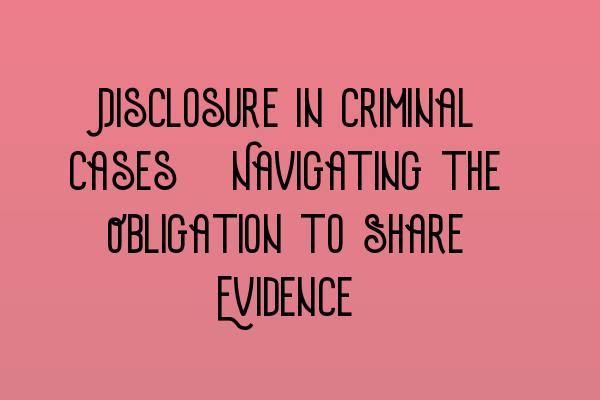Disclosure in Criminal Cases: Navigating the Obligation to Share Evidence
Welcome to the SQE Criminal Law & Practice Law UK blog! In today’s article, we will be discussing the crucial topic of disclosure in criminal cases. Disclosure refers to the obligation of the prosecution to share all relevant evidence with the defense team. This process plays a vital role in ensuring a fair trial and upholding the principles of justice.
The Importance of Disclosure
Disclosure is a fundamental aspect of the criminal justice system that aims to provide a level playing field for both the prosecution and defense. It allows the defense to properly prepare their case, challenge the evidence presented against their client, and ensure that no unfair advantage is given to the prosecution.
Without adequate disclosure, the defense may be deprived of crucial information that could impact the outcome of the trial. This could lead to wrongful convictions or miscarriages of justice. It is therefore imperative that all relevant evidence is disclosed in a timely manner to ensure a fair trial.
Navigating the Disclosure Process
The process of disclosure can be complex and challenging for both the prosecution and the defense. It involves identifying, gathering, reviewing, and sharing all relevant evidence. This includes documents, witness statements, expert reports, and any other material that may be relevant to the case.
As a defense solicitor, it is important to have a thorough understanding of the disclosure obligations and processes. This includes being aware of the guidelines set out by the Criminal Procedure Rules and keeping up-to-date with any changes or updates in the law.
One crucial aspect of disclosure is the duty of ongoing disclosure. This means that both the prosecution and the defense have an obligation to disclose any new evidence that becomes available throughout the course of the trial. Failure to comply with this duty can have serious consequences and may result in the exclusion of evidence or even the collapse of the trial.
Challenges in Disclosure
Despite the importance of disclosure, there are several challenges that can arise during the process. These challenges can include issues such as large volumes of digital evidence, confidentiality concerns, third-party material, and disclosure of sensitive information.
In order to navigate these challenges effectively, it is essential to have a robust system in place for managing and reviewing evidence. Utilizing technology and specialized software can greatly enhance the efficiency and accuracy of the disclosure process.
Conclusion
Disclosure is a critical aspect of criminal cases that ensures a fair trial and protects the rights of the accused. Navigating the disclosure process requires a comprehensive understanding of the obligations and challenges involved.
At SQE Criminal Law & Practice Law UK, we offer comprehensive preparation courses for SQE 1 and SQE 2 exams, covering all the essential topics including disclosure in criminal cases. If you are preparing for the SQE exams, we recommend checking out our SQE 1 Practice Exam Questions and SQE 1 Practice Mocks FLK1 FLK2 to test your knowledge.
For further assistance and guidance, feel free to explore our SQE 2 Preparation Courses and SQE 1 Preparation Courses. Stay updated with the latest SRA SQE Exam Dates to plan your study schedule effectively.
Thank you for reading and stay tuned for more informative articles on criminal law and practice!
